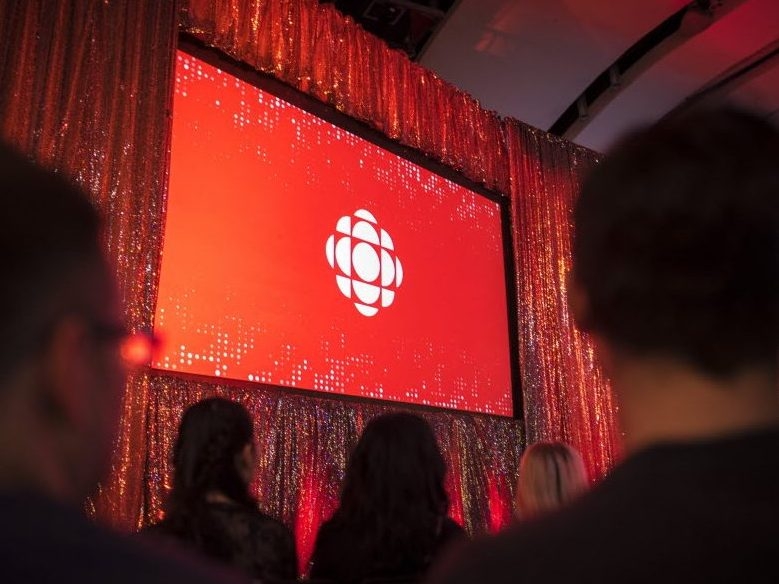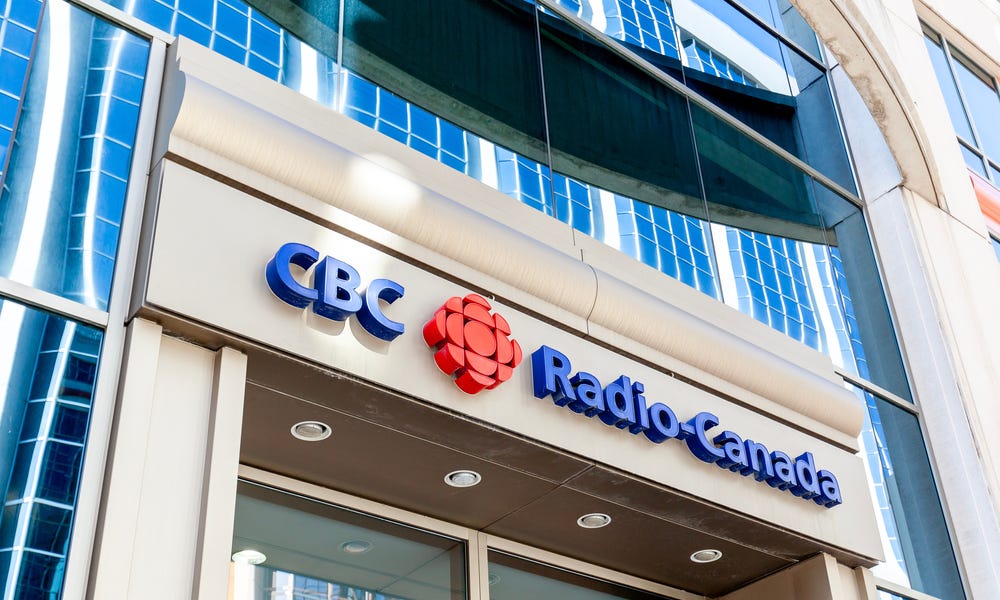Jen Gerson: Everybody is being dumb
If you want to fight, you have to know which battles are worth winning. Fight smart, not hard.
 JEN GERSONhttps://substack.com/profile/1651589-jen-gerson
JEN GERSONhttps://substack.com/profile/1651589-jen-gerson
Everybody is being dumb.
Yes, I realize that most of my columns could start this way, however in the case of the incident in question, I believe the sentence above can truly be applied universally.
This time, I'm talking about this spat between the CBC, Pierre Poilievre, and Twitter, in which this triptych of poor judgement, trollery and self-importance is lays itself out before us like a tableau of social media wankery.
In case you are clever enough to avoid online theatrics, let me explain: Twitter has been labelling the accounts of successive Western public media outlets like NPR and the BBC as "government funded media" — a moniker that feels a little like the "state-affiliated" tag affixed to organizations like RT. (Twitter initially labelled NPR as "state-affiliated," leading to the organization fleeing the site. The platform reversed course and now notes NPR is "government funded.")
The CBC was hit in this wave, and it is hardly alone in this shift: In recent days, similar labels have also been applied to the Australian Broadcasting Company (ABC Australia), New Zealand’s public broadcaster RNZ and Sweden’s SR Ekot and SVT.
Taking full advantage of this situation at home was Poilievre, who rather gleefully — and idiotically — used the label to declare that now "people know that it is Trudeau propaganda, not news.”
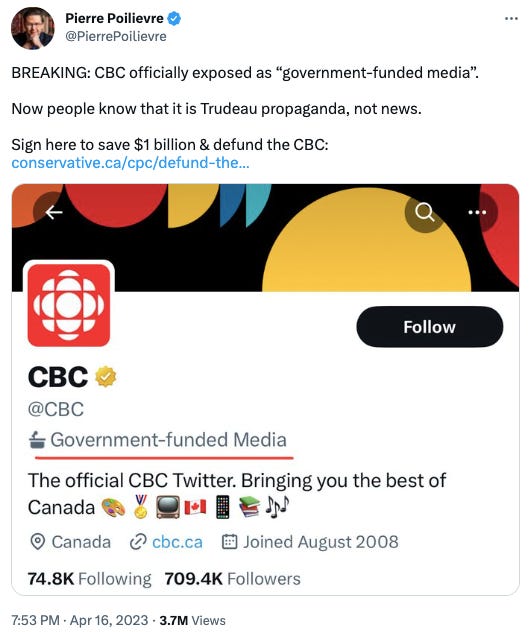
Meanwhile, the CBC noted that it was not fully government-funded, prompting Twitter's owner Elon Musk to respond with ... generosity? He changed the label to "69% government funded."
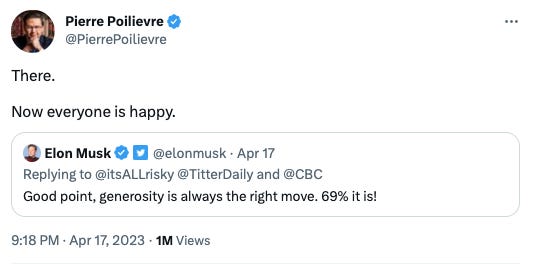
Rather than accept Twitter's label with a touch of grace and good humour, the CBC instead tried to argue semantics and found itself trapped waist-deep in the sewage-infested mire of the troll swamps. Its final response was to take its ball and go home: pulling its services from the platform, and serving up a dose of huffy umbrage as it tried to claw its way out of the muck.
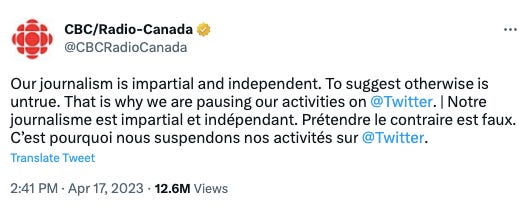
Look, we at
The Line have spent some months trying to warn our fellow journalists: as a professional class, we've all gotten so high on our internal supply of self importance that we've lost the ability to recognize obvious criticism and risks. The public does not like us very much. They don't trust us, either. That makes us obvious targets for public figures and politicians looking to score cheap points.
There isn't always an obvious response to this problem. Sometimes the solution is to fight, in court or in the public battlefield. That’s fine. But if you want to fight, you have to know which battles are worth winning. Fight smart, not hard.
Sometimes a conflict is exactly what our critics want, and by engaging in the battle, we actually demean ourselves and undermine our own credibility in the process. That is the purpose — nay, the very art — of the troll.
This is one of the latter examples.
Labelling the CBC "government-funded," as distinct from "government-controlled" or "state-affiliated," is entirely accurate. It just is. It’s literally true. This was therefore not a battle that the CBC could win on facts. And the sense of outrage it elicited tells us a lot about the public broadcaster's own collective insecurities.
Know what really doesn't play well on Twitter? (And I say this with some hard-won experience). Huffy umbrage laced with insecurity.
There was only one good way to respond to Musk's latest manic episode, and it goes something like this:
"The CBC is honoured to be government-funded media. We believe that in a free and open democracy, independent media, non-partisan and publicly funded organizations like ours play a crucial role in supplying important journalism in areas and topics that are underserved by private enterprise. It is an honour for us to serve Canadians in this way, and we thank them for the chance to continue telling their stories."
Yada yada, you get the point. That took me about 45 seconds to think up and then type out. What’s the CBC waiting for? Is it possible that CBC writers don’t say this because they don’t actually feel this? That they don’t treat their funding as a government allotment, but rather as an entitlement? And that they don’t see themselves as serving Canadians so much as dictating a cultural identity to them?
Now, I can hear the objections already: Twitter defines a "government-funded" label not just by the source or revenue, but also where the government "may have varying degrees of government involvement over editorial content."
No credible person believes that someone from the PMO is calling up CBC President Catherine Tait and demanding unflattering stories get pulled, but can we really claim that the Canadian state has no degree of involvement over editorial content by this definition?
The CBC’s broad editorial mandate is literally written into the Broadcasting Act. And while I find that mandate to be vague and largely unobjectionable, the act explicitly reads that CBC "is ultimately accountable, through the Minister, to Parliament for the conduct of its affairs."
Another example: A recent amendment made in the Senate to Bill C-11 would bar the CBC from publishing sponsored content, a move that CBC President Catherine Tait has publicly opposed.
Heck, last year the CRTC — an, ahem, government agency — granted the CBC a licensure renewal only on the grounds that in coming years, the English-language services must dedicate a third of its spending in independent programming to be "produced by Indigenous producers, [Official Language Minority Communities] producers, racialized producers, producers with disabilities, and producers who self-identify as LGBTQ2."
Does anyone still want to claim that the government exerts no editorial control, here? Really? For all its claims of independence, the government isn’t tossing the broadcaster $1.2 billion annually and telling them to just go at it.
Then there's the question of the CBC's impartiality.
How exactly are we to square that claim with the fact that this is the same broadcaster that sued the Conservative party in the last election? How does it sit with this too-soon forgotten interview with the aforementioned Tait, in which she weighed into partisan matters by declaring
Poilievre's promise to defund the CBC a fundraising slogan.
From the same interview: “There’s a lot of CBC bashing going on — somewhat stoked by the Leader of the Opposition.”
Conservatives don't like the CBC. From their perspective, it amounts to a sense that far from being a cultural unifier — as per its government mandate — the network is a font of shows, worldviews, editorial focus and media personalities that feel like a simulacrum of a culture imposed upon the nation from the distant enclaves of the Annex.
Do we need to get into the litany of First-Person gems like "
Using my new year's resolution to free my tree, and myself, from the bondage of colonization" or "
On election day, I greeted people who voted for candidates who might hate people like me" to demonstrate this point?
Add to this, the CBC's weird habit of underplaying Liberal scandals, and it’s no mystery as to why so many conservative-identified Canadians don't see themselves or their views reflected in the public broadcaster that they pay for with their tax dollars. Tossing the odd right-ish pundit onto a panel doesn’t resolve the problem.
Conservatives almost uniformly believe that the CBC is biased, that the whole institution is a taxpayer-funded scheme to indoctrinate the country into a set of ideological values and to re-elect the Liberals. The accuracy of this perception is a matter for another column. (It's certainly less accurate than some Conservatives would like to believe, if for no other reason that the CBC isn't one singular ideological mass, but rather a vaguely dysfunctional, multi-headed hydra based in Toronto and constantly at war with itself in a never-ending quest for internal supremacy. But I digress.) It’s not hard to understand why so many Conservatives would cheer on Musk’s newfound love of the label maker.
The only very obvious problem with the "government-funded" Twitter label is that it is a disingenuous attempt to paint publicly funded broadcasters like the CBC as akin to Pravda or RT.
And, yeah, of course that's the goal! Elon Musk should not have the benefit of anyone's doubt. Jesus, he changed the CBC's Twitter label to "69% government funded" for a titter on a whim. These are not the actions of a man operating in his capacity as a world-spanning genius, to put it lightly. But the fact that Musk is acting dumb doesn't really absolve the CBC from rising above a juvenile bunfight with a man child.
And as for Mr. Poilievre, his response is perhaps the dumbest of them all.
I won't rule out that in calling the CBC mean names, he is actually reading the room rather well — or, at least, he's reading a room filled with pudgy men in chaps.
But Poilievre
is being dumb, and wilfully so. The CBC has issues, but it isn't "propaganda" and he must know this. By calling it that, he's undermining his own credibility in a way that will undercut his ability to reform the broadcaster should he come to power.
The media is in crisis. The federal government has a powerful tool to address the collapse in revenue that is destroying private media outlets — a collapse that is leaving stories uncovered and communities unserved.
That tool is the CBC. But the only way the CBC is going to be able to fill the news gap in a responsible and functional way is through a very serious and thorough mandate review. It's a review that must come, and must tackle the tricky questions of what a public broadcaster's role ought to be in a modern, digital Canadian society.
Poilievre is entirely within his democratic rights to campaign on a platform of defunding the CBC — because, you know, the CBC is a government-funded creature of the Canadian state — but that's actually a bad answer to the problem that the CBC presents.
The Conservative leader is only going to gain the goodwill and buy-in necessary to overhaul the public broadcaster if he comes across as a reasonable and thoughtful policy minded leader — not some lunatic claiming that Trudeau is using the CBC to make the frogs gay, or something.
So what happens when a dumb political leader meets a dumb public broadcaster on a dumb social media platform?
Well, as far as I can tell, everyone winds up dumber.


